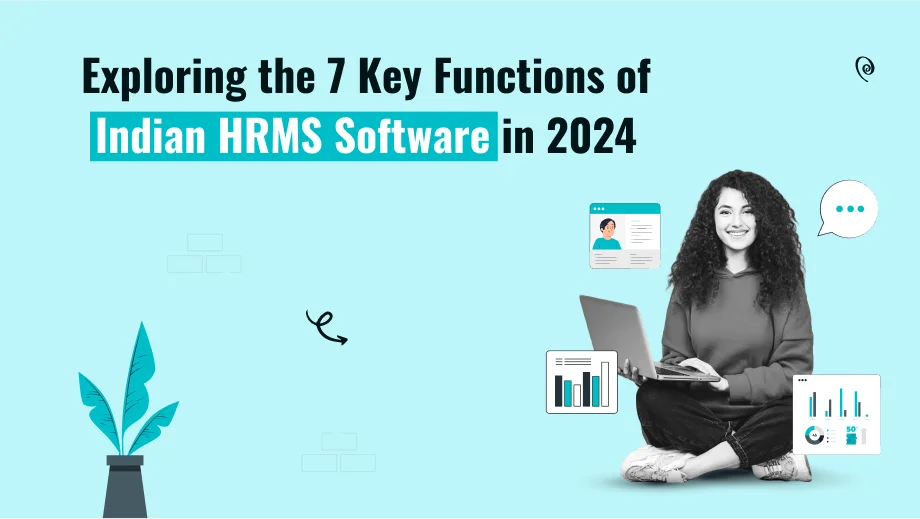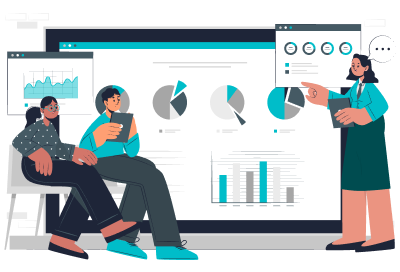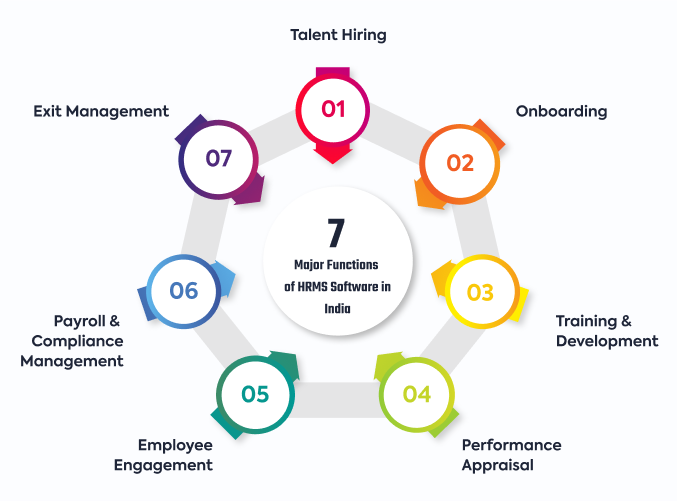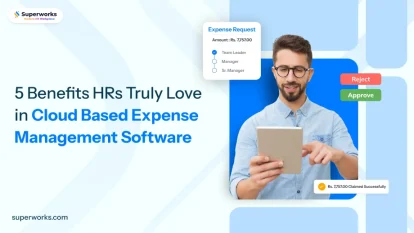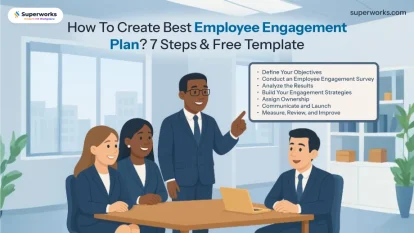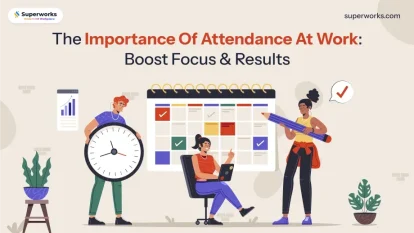Grab a chance to avail 6 Months of Performance Module for FREE
Book a free demo session & learn more about it!
-
Will customized solution for your needs
-
Empowering users with user-friendly features
-
Driving success across diverse industries, everywhere.
Grab a chance to avail 6 Months of Performance Module for FREE
Book a free demo session & learn more about it!
Superworks
Modern HR Workplace
Your Partner in the entire Employee Life Cycle
From recruitment to retirement manage every stage of employee lifecycle with ease.


Seamless onboarding & offboarding
Automated compliance & payroll
Track performance & engagement
Exploring the 7 Key Functions of Indian HRMS Software in 2024
- india hrms
- 12 min read
- July 3, 2023
Agree or not?
Whatever the industry you are working in, the HR function is the most important. There are multiple tasks that only HR can do and handle.
In that case, you need“MAGIC WAND”!– HRMS software
Also, in the ever-evolving landscape of Indian businesses, it has become increasingly crucial to leverage advanced HR Technology to optimize HR operations. With the emergence of Indian HRMS (Human Resource Management System) software, organizations now have access to a comprehensive solution tailored to their specific needs.
This blog explores the 7 major functions needed in HR software in India, shedding light on how it revolutionizes human resources management. From streamlined employee onboarding and attendance tracking to robust performance management and payroll automation, The best HR software in India empowers businesses to enhance productivity, ensure compliance, and foster a positive work environment.
Join us on this insightful journey as we delve into the transformative capabilities of HRMS software in India, uncovering the HRMS tools and features that are driving organizational success in the modern Indian business landscape.
What Is Human Resource Management?
human resource management software (HRMS) is a strategic approach adopted by organizations to effectively oversee their workforce. Its primary objective is- to manage the workforce to achieve company goals successfully. By implementing a range of policies, practices, and processes, HRM ensures that employees are motivated, skilled, and productive. There are multiple functions considered in core HR, and they need to be added to the best hr software in India.
The core functions of HRM encompass,
-
Recruiting and hiring the right talent
-
Providing training and development opportunities
-
Implementing performance management systems
-
Establishing fair and competitive compensation structures
-
Fostering positive employee relations.
HRM enables businesses to maximize the potential of their employees, leading to improved productivity, innovation, and overall performance. Ultimately, effective HRM practices facilitate the achievement of organizational objectives by harnessing the potential of the workforce and creating an environment conducive to success.
To Read More: 8 Reasons to Choose HRMS Software for Successful Remote Working
What Is Human Resource Management Software?
Human Resources Management Software (HRMS) is a mostly SaaS-based, cloud-based application designed to streamline and automate various HR functions within an organization.
The HR software in India serves as a centralized platform that integrates multiple HR processes, allowing businesses to have accurate human capital management.
HRMS encompasses a wide range of features like,
-
employee data management
-
attendance tracking
-
payroll processing
-
benefits administration
-
performance management
-
training and development
-
recruitment and onboarding
-
employee self-service portals
By leveraging HRMS software, businesses can streamline their HR processes, reduce administrative burdens, and allocate more time and resources to strategic HR initiatives. The software enhances communication between HR departments and employees, promotes employee engagement, and improves workforce productivity. With its user-friendly interface and customizable features, HRMS online software caters to the specific needs of organizations, regardless of their size or industry.
Overall, Human Resources Management System simplifies HR tasks, enhances data accuracy, improves compliance, and empowers HR professionals to focus on strategic HR initiatives that contribute to the success and growth of the organization.
Read more: How Software Human Resources Can Manage Employee Data & Save Your Time?

Ready to transform HR management? – Experience the power of HRMS!
Streamline your processes, enhance employee engagement, and drive organizational success. Discover the benefits of HRMS software and take your HR management to new heights. Schedule a demo or get in touch with our team to learn more.
Don’t wait, unlock the full potential of your HR function with HRMS software now!
7 Major Functions of HRMS Software in India
As per the above discussion, here we will elaborate on the key functions of the HRMS software in India, lets deep in dive.
1. Talent Hiring
Employees are assets of the company and the right talent should be hired at the right place. So, Talent hiring or recruitment is one of the major key functions of the top 10 HR software in india.
To begin the hiring process, HR managers collaborate with relevant platforms to develop comprehensive job descriptions that outline the responsibilities and qualifications required for each position.
It is crucial for HR managers to ensure that the recruitment process is efficient and successful, attracting and hiring the best candidates for the job.
HR managers are tasked with,
-
-
Creating job descriptions
-
These job descriptions serve as a guideline to attract candidates who possess the necessary skills and experience.
-
-
Advertising job openings
-
HR managers then utilize various channels, such as online job boards, social media platforms, and professional networks, to advertise job opportunities.
-
-
Sourcing potential candidates
-
After that, they reach a wide pool of potential candidates for sourcing potential candidates.
-
-
Reviewing resumes
-
After receiving leave application, HR managers review resumes and assess candidates based on their qualifications and relevant experience. Through this screening process, they shortlist candidates who closely match the requirements stated in the job description. Following the initial screening.
-
-
Scheduling interviews
-
Following the initial screening, HR managers conduct interviews to further evaluate the shortlisted candidates. The interviews provide an opportunity to assess the candidates’ interpersonal skills, problem-solving abilities, and cultural fit within the organization.
-
-
Ultimately selecting the most suitable individuals
-
By making informed decisions based on the evaluation of resumes and interviews, HR managers select the most suitable candidates for the job, ensuring the organization builds a talented and capable workforce.
2. Onboarding
After Recruitment, HR onboarding with a perfect offer letter, welcome letter, and process is necessary. Onboarding is a crucial function in HR management that focuses on the seamless integration of new employees into an organization.
The primary goal of onboarding is to ensure that new employees feel welcomed, supported, and equipped with the necessary information and resources to succeed in their roles. HR managers play a pivotal role in designing and implementing an effective employee onboarding process.
It encompasses various activities such as-
-
-
Completing new hire paperwork
-
They ensure that new employees receive the necessary paperwork and complete the required documentation, such as employment contracts, tax forms, and benefit enrollment forms.
-
-
Providing orientation sessions
-
Additionally, HR managers organize orientation sessions to familiarize new hires with the company’s policies, procedures, and organizational structure.
-
-
Introducing the new employee
-
These sessions may also include introductions to key team members, providing an opportunity for the new employee to start building relationships within the organization.
-
-
Introducing the new employee
-
They ensure that the onboarding process goes beyond administrative tasks by emphasizing the company’s culture, values, and expectations.
-
Establishing clear expectations
HR managers may assign mentors or buddies to new hires to facilitate their integration, answer questions, and provide guidance.
Moreover, HR managers recognize the importance of fostering a positive onboarding experience to help new employees feel valued and supported. By investing time and effort into onboarding, HR managers contribute to creating a positive and engaging work environment, enabling new employees to quickly adapt, contribute effectively, and thrive within the organization.
3. Training & Development
One of the features of HRMS or HRM is training and development. It is very crucial to train employees as per the particular role, which can lead to improved performance.
HR managers are responsible for,
-
-
Identifying training needs
-
The human resources management department plays a vital role in this function by identifying the training needs of employees.
-
-
Designing and developing training programs
-
The HRM department designs and develops effective training programs, and delivers engaging and informative training sessions.
-
Delivering training sessions
HR managers continuously evaluate the effectiveness of training programs to ensure their success.
Human resource managers must ensure that development & training programs are suitable to the needs of employees as well as the organization.
Training and development is a crucial function within human resource management (HRM) that aims to enhance employees’ skills, knowledge, and capabilities, ultimately leading to improved performance.
4. Performance Appraisal
Performance appraisal is the process of reviewing and delivering feedback to employees. Setting particular performance goals, giving reviews, and giving performance improvement strategies are all part of this process. Human resource managers or project managers must ensure that the appraisal letter process is fair, and connected with the goals of the company.
This module is well-connected with – Attendance management, leave management, performance management, and workforce management – because before considering any employee for the appraisal you need to check employee attendance and leave their work and performance.
The performance appraisal function in human resource management (HRM) plays a crucial role in assessing and providing feedback to employees.
The human resources management team is responsible for,
-
Establishing clear performance goals
-
Conducting regular performance reviews
-
Developing strategies for performance improvement
By fostering a culture of continuous improvement and development, HR managers contribute to maximizing employee potential and aligning individual performance with organizational goals.
5. Employee Engagement
The HRM task of managing relationships between workers and companies is known as “employee engagement.” Employee participation must be encouraged, employee concerns must be addressed, and management and employee communication must be facilitated.
To promote employee engagement, your HR implements various initiatives and strategies. They establish open lines of communication to encourage employees to voice their opinions, ideas, and concerns.
HR managers actively,
-
Listen to employee feedback
-
Address their concerns
-
Take appropriate actions to improve working conditions.
By creating a culture of transparency and trust, HR managers foster a sense of belonging and ownership among employees. Moreover, HR managers implement recognition and rewards programs to appreciate and motivate employees. By investing in employee development and well-being, your HR managers contribute to enhancing HR employee engagement and overall job satisfaction.
6. Payroll & Compliance Management
Payroll management is the part of HR management responsible for overseeing the salaries and benefits of employees. Payroll laws must be followed, and owners must make sure the payroll software should be accurate & effective.
They play a vital role in guaranteeing that employees are paid fairly and provided with appropriate benefits.
HR managers are responsible for overseeing the payroll process, which involves various tasks such as
-
Calculating employee salaries
-
Deducting taxes
-
Administering benefits
-
Counting expenses
In addition to managing the technical aspects of payroll, HR managers also prioritize fairness and employee well-being. They strive to ensure that employees are paid appropriately based on their roles, responsibilities, and market standards. By effectively managing Indian payroll, HR managers contribute to employee satisfaction, trust, and the overall financial health of the organization.
7. Exit Management
Exit management is as important as onboarding in any company. It usually deals with the departure of personnel from a company.
HR managers are responsible for,
-
Conducting exit interviews
-
Managing the offboarding process
-
Ensuring legal and ethical compliance
When an employee decides to leave the company, HR managers conduct exit interviews to gather valuable feedback and insights. These interviews provide an opportunity for departing employees to share their reasons for leaving, their experiences within the organization, and any suggestions or concerns they may have.
HR managers carefully analyze this feedback to identify patterns or areas for improvement that can enhance employee retention and organizational effectiveness.
In addition to conducting exit interviews, HR managers manage the offboarding process, which involves various tasks such as
-
Updating personnel records
-
Facilitating knowledge transfer
-
Collecting company assets
-
Ensuring a smooth transition
They collaborate with other departments, such as IT and finance, to ensure that all necessary processes and paperwork just like offboarding HR letters are completed accurately and promptly. Effective offboarding processes also help to preserve positive relationships with departing employees, which can lead to potential referrals or future re-employment opportunities.
Also, See: Unified HRMS With Payroll for Superior Employee Management
How All HRM Functions Can Be Handled Easily? – HR Software in India
There are multiple ways to handle all HRM functions, but there is one reliable way that can be more feasible.
Yes, you read right! HRMS software can help you manage all HRM functions in one go!
How? If you don’t know then let us tell you about HRMS is the MAGIC WAND for you!
The HR software in India offers a comprehensive HRMS solutions to streamline and optimize HRM functions.
-
The Best HR software in India provides a centralized platform for managing employee data
-
It helps automate recruitment processes
-
It helps facilitate training and development initiatives
-
It helps simplify performance appraisals
-
It helps enhance employee engagement
-
It helps ensure accurate payroll management
-
It helps manage the offboarding process
With HR software, organizations can efficiently handle all aspects of HRM, saving time, reducing administrative burden, and promoting a more engaging and effective HR management experience.
HCM, or Human Capital Management, encompasses a range of functions related to managing an organization’s workforce. It includes activities such as talent acquisition, employee onboarding, training and development, performance appraisal, employee engagement, payroll management, and exit management.
HRM plays a crucial role in ensuring the effective utilization of human resources, aligning them with organizational goals, and creating a positive work environment that fosters employee growth and productivity.
At last,
In conclusion, the human resource management system or India HRMS plays a vital role in effectively managing an organization’s workforce throughout the employee lifecycle. From attracting and selecting top talent to ensuring their successful onboarding and development, HRMS is crucial in creating a motivated and high-performing workforce.
If you are thinking that, is it possible that all functions can be done with one and only HR software in India? – yes it is possible, you need to check – Superworks – Super HRMS!
By prioritizing the core functions of HRMS and adopting a strategic approach, organizations can unlock the full potential of their workforce, which ultimately drives their success. With the right people in the right positions, equipped with the necessary skills and motivation, organizations can achieve their goals and objectives effectively and sustainably.
Let’s do it together! We cover your back.
Also see: hr payroll software
